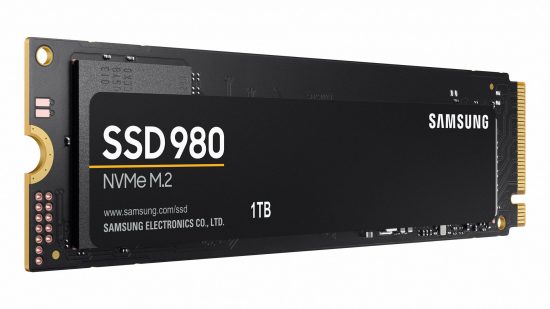Our Verdict
79%Not a bad SSD, but its performance is disappointing given Samsung’s previously excellent PCI-E 3 drives.
Some of Samsung’s older PCI-E 3 SSDs have been among our favorites over the years and, somewhat unexpectedly, the company’s new vanilla 980 drive doesn’t offer PCI-E 4 performance on a budget. Instead, it sticks with the same PCI-E 3 interface as Samsung’s 970-series drives. Only its more expensive sibling, the Samsung 980 Pro, has made the move up to the speedier PCI-E 4 interface.
Thankfully, with a cost of $117 for 1TB of storage space, the 980 is certainly more wallet-friendly than the $183 demanded by the 980 Pro, with its nearest competitor being the ADATA XPG GAMMIX S50 Lite. However, that ADATA drive has made the move to PCI-E 4, and it has a 2TB option as well. The Samsung 980 range stops at 1TB at the moment.
In an effort to make the 980 as affordable as possible, Samsung has ditched a DRAM cache and instead relied on its TurboWrite 2 technology to write to an SLC cache. This cache is also a little smaller than the allocation on some other SSDs in its class, at just 160GB, although this is still a lot larger than the likes of Samsung’s 970 Evo Plus. The ADATA XPG GAMMIX S50 Lite has a bigger SLC cache, for example, at least when the drive is empty, and it also sports DRAM caching too, so it could have a little more grunt in some areas.
There’s no large heatsink included with the 980, but Samsung has included the usual sliver of copper on the underside. Of course, one thing that PCI-E 3 SSDs usually have going for them is that throttling generally isn’t an issue, and we’re pleased to report that, despite hitting a peak temperature of over 70°C, this didn’t seem to impact the drive’s performance. This is in contrast to the ADATA XPG GAMMIX S50 Lite, which saw its speeds fall away quickly if we didn’t use our motherboard’s heatsink to keep its temperature in check.
Sadly for Samsung, the ADATA XPG GAMMIX S50 Lite was faster in practically every test, adding over 400MB/sec to the sequential read speed in CrystalDiskMark and nearly 200MB/sec to the write speed.
The difference between the drives was even when it came to 4K random read and write tests, but switching to AS-SSD again saw the Samsung 980 perform noticeably worse in its 4K random read and write tests, with leads for the ADATA SSD in the 64-thread random 4K IOPS read and write tests as well – the latter produced 527,058 IOPS compared to just 399,375 for the Samsung drive.
On the plus side, the Samsung 980 was significantly faster almost across the board than the WD SN550, adding over 1,000MB/sec to the CrystalDiskMark sequential right speed and nearly doubling its 4K 64-thread read speed, but to be fair that WD drive is also $34 cheaper.
Samsung 980 pros and cons
Pros
- No need for heatsink in most cases
- Good warranty and endurance
- As fast as pricier SSDs in some tests
Cons
- Similarly-priced PCI-E 4 SSDs are faster
- Average 4K random read and write performance
- No 2TB option
Samsung 980 specs
The Samsung 980 specs list is:
| Interface | PCI-E 3 |
| Max capacity | 1TB |
| Formatted capacity | 931GB |
| Controller | Samsung Pablo |
| Endurance rating | 600TBW (1TB) |
| Warranty | Five years |
| NAND | TLC |
Samsung 980 price
Price: Expect to pay $117 for 1TB
Samsung 980 review conclusion
The Samsung 980 doesn’t find itself in a particularly easy spot, even if its lack of a heatsink didn’t result in throttling. The omission of a DRAM cache seems to hurt it in a few tests, and the similarly-priced ADATA XPG GAMMIX S50 Lite was quicker almost across the board.
The Samsung is certainly a lot quicker than the WD SN550, but it demands a $34 premium for the privilege, and you’re unlikely to notice much difference in real-world use. Ultimately, there are no stand-out numbers here for Samsung and the ADATA XPG GAMMIX S50 Lite is definitely a better buy if you have a heatsink for it.
Looking for more storage upgrade options? Check out our guide to the best gaming SSD where we recommend options for every budget, with 1TB drives starting from just $55.
